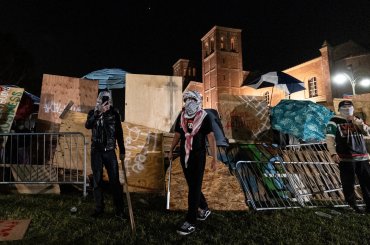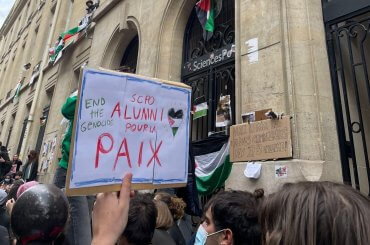The struggle for social justice on the streets of Baltimore was likened to the struggle of the Palestinian people by two speakers at a recent conference exploring ways that black Christians and the African-American church can respond to the suffering and discrimination experienced by Palestinians living in Israel/ Palestine.
The first keynote speaker was the Rev. Dr. Heber M. Brown III, Senior Pastor of the New Hope Baptist Church in Baltimore. Rev. Dr. Brown described his experience on the streets of West Baltimore during the community uprising in response to the death of Freddie Gray while in police custody and compared that popular spirit to his experience of the Palestinian struggle gained during a delegation to the occupied West Bank with Interfaith Peace-Builders. The half-day conference, entitled “Palestine and Zion: The Journey for Civil Rights” was held at the Sixth Presbyterian Church in Washington, DC and sponsored by Sabeel DC Metro.
The second keynote speaker was Rev. Graylan S. Hagler, Senior Minister of the Plymouth Congregational United Church of Christ (UCC) in Washington DC, who was born and raised in Baltimore. Rev. Hagler praised the spirit of the young people on the streets in Baltimore and condemned the failure of political leadership both in Baltimore and in Palestine (3:14):
When I stood out on the streets on Monday [April 27] and watched what was going down, I’m going to tell you the truth, it looked like one of the intifadas to me. People going after police cars, but with police in them I’ve got to add. In other words we’re talking about bricks and rocks agains Glocks, that folks went after without fear because they understood that they had to step into the midst to turn the situation around, to lift up the debate in new ways and incredible ways. Historically speaking, when the original intifada took off, one of the reasons was that folks began to feel that the PLO had begun to misrepresent them. The young folks again, stepped out, the young folks made a statement with their own bodies so that the leadership had to follow, and then the leadership had to figure out a way in order to get back in front of the movement. What do you think is going on in Baltimore is that the political leadership has failed and the young folks took to the streets in rebellion and set up a paradigm where the political leadership had to figure out how to get back in front of the young folks so that they can claim credibility. God bless the young folks who took to the streets.
One of the themes of Rev. Hagler’s talk was how the denial of racism is a critical element used to propagate racist enterprises whether in Baltimore today, or in the Unites States throughout its history, or in Israel/Palestine (7:32):
The young people have been marching about the persistent and pervasive presence of racism with all of its brutality and yet denial of people and denial that racism continues to exist. You ever notice that? This is what we as black people and people of color are having to deal with all the time, is white folks telling us that racism doesn’t exist, or that we should get over it, or “You got a President in the White House who is black, and so it can’t be that bad. What are you all complaining about?” But historically, always racism has been justified as being something that is non-existent and therefore people of color must be hallucinating about it. When Indians talked about being pushed off their land, what were they talking about? Right? They were the violent folks, and the folks who settled the lands were the peaceful folks just trying to advance civilization. And when black people say they’re having heartburn about what takes place in their community or what takes place on the job, everybody is saying “Now why are you such a malcontent?” And what I’m getting at here is that we cannot see what’s going on in Palestine because Palestine is another racist paradigm, where folks want to deny that it exists.
Rev. Hagler went on to illustrate how the denial of racism in Israel/ Palestine has parallels to the denial of racism that supported the enterprise of human slavery in the Antebellum South (9:58):
If you understand what I’m trying to say here, it’s that in every single instance in the world, including Palestine, the fact is folks want to deny racism when racism exists when racism is part of the problem. When I was there a year ago January, for example, there were Africans that were marching because Africans had been put out into a camp and had broken out of a camp they were from Somalia, and the Sudan, and Eritrea, and the government of Israel referred to them not as refugees but as infiltrators. Infiltrators is a military term. When you infiltrate my lines you deserve to be shot. Right? That’s what will happen. So to even use that word, now the issue they don’t want to use “refugee” is because if they use “refugee” then they would have to afford some rights to those folks. But it’s the same thing, understand, it’s just the same thing as when black folks were categorized as three-fifths of a human being. You could not be a full human being, because that argument would require that you bestow some rights upon someone who was a full human being, and the South was simply using three-fifths of a human being in order for the South to have greater representation in Congress and therefore wanted to count their slaves so they could do that but not bestow upon those slaves full humanity. So we begin to understand that some of the things around racism, it continues to be this paradigm that it doesn’t exist.
The recent appearance by Benjamin Netanyahu before Congress raised the consciousness of some of Rev. Hagler’s congregants regarding the Israeli leader’s implicit racism toward President Obama (11:28)
Folks in my church got upset, and I finally was able to have some breakthrough with folk in my church, when Netanyahu came and spoke to Congress. Why was that so important? Because folks in the black community, they see assault, after assault, after assault on President Barack Obama, not because of his policies, but because his skin is black. And the invitation to Netanyahu to come and speak to Congress, and not to go through the protocol of really dealing with the White House was a slap in the face by Congress of this black President, and was also a slap in the face by the president of Israel Netanyahu, again disrespecting a black face in the White House. Now you can talk to every preacher, and every preacher knows this point: that you don’t go into somebody else’s pulpit unless you ask the preacher is it alright to come into the pulpit, you know, and the fact is you don’t go into somebody else’s country and speak before a legislative body unless you ask the leader of that country, is it alright for me to come in and speak to your legislative body. But you can do it, if the face in the white man’s house is black! Understand what I’m getting at here.
Rev. Hagler recently proposed putting up a sign saying “End the Occupation” on the lawn of the Plymouth Congregational church, where he is Senior Minister. The proposal has been met with some resistance within his congregation, which Rev. Hagler is determined to overcome (24:38)
I’m coming back, I’m going to put a sign on the church’s lawn, even if it doesn’t happen until they carry me out feet first, but a sign is coming on Plymouth’s lawn. Can you imagine, and this is the way I want you to think about it, the statement that would be made if churches, here in the Nation’s Capital, actually put up signs that said “End the Occupation, Free Palestine” on their lawns like we did when we said “Free South Africa”? Because if that’s apartheid, and that’s apartheid, if we stood up for that apartheid then we need to stand up against this apartheid. We cannot just simply pick and choose, where we’re going to stand, and who we’re going to stand with. I made a commitment when I deal with this anti-racist stuff that I deal with, I made a commitment that I have to stand against racism whether it exists in the United States of America, or whether it exists in Palestine, or whether it exists in South Africa, or whether it exists any place on this earth… We got to stand up against the Occupation, and we have to stand for Boycott, Divestment, and Sanctions. We have to stand and make our case known- it’s about justice, it’s about people, it’s about not denying that racism exists, it’s about lifting up world humanity to a place where all can be free and secure. God bless you.
After the two keynote speakers, a panel of three individuals, two Palestinian-Americans and a Jewish American spoke about their personal experiences in Israel/ Palestine and what the response of the Americans and the black church should be to the oppression and discrimination faced by Palestinians there. The three panelists were Tarek Abuata, JD, an attorney and nonviolence organizer who serves as the Palestine Coordinator for the Christian Peacemaker Teams, Dr. Mai Abdul Rahman,writer, organizer, educator and board member of the Muslim Women’s Association, and Shelley Fudge, environmentalist, community organizer and founder of the DC Metro Chapter of Jewish Voice for Peace. For more information, the Sabeel DC Metro website is www.sabeeldc.org.



Thank you for this most excellent article, Bill. Sabeel is doing great work!
“…I made a commitment that I have to stand against racism whether it exists in the United States of America, or whether it exists in Palestine, or whether it exists in South Africa, or whether it exists any place on this earth… We got to stand up against the Occupation, and we have to stand for Boycott, Divestment, and Sanctions. We have to stand and make our case known- it’s about justice, it’s about people, it’s about not denying that racism exists, it’s about lifting up world humanity to a place where all can be free and secure. God bless you.”
Hallelujah, Amen, and Inshallah!
Finding “…some breakthru with folk”.
Maybe reminding older folk, about their own idealism in their own youth, is a good way to broaden support.
Thanks Bill, I agree, this was an eye-opener. It suggests Baltimore’s great potential in the US discourse…
Very inspiring. Very true.
When we planned this and invited these two pastors, little did we know about the deeper connections that fate would bring to this forum. It hasn’t been easy getting the African American church community behind the Palestinian cause, despite the obvious similarities. They’ve generally connected more with the Israelites’ Exodus story. Now the connection with the Babylonian exile is becoming clearer and more recognized, and it’s helping black congregations to understand the plight of Palestinians.